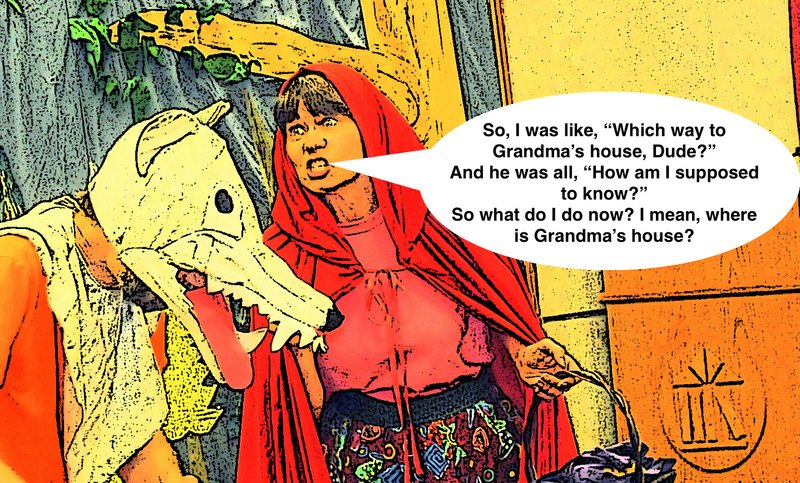Some stories begin with "Once upon a time." Some start with the cliched "It was a dark and stormy night." Others begin less dramatically with "Well."
In recent years, though, speakers have been using "so" to launch into a story. And that seems to irritate a lot of other people.
Traditionally, "so" has been labeled a "discourse marker." Others are "yet," "therefore" and "however." Each subtly signals which way the conversation will go.
When I'm out with a friend, I might ask, "So, how did the meeting with your new boss go?"
That little word "so" says a lot. It could be translated as, "Oh, I know this isn't the subject we're on now, but I just remembered I wanted to ask you about this other thing."
"So" can also be used to get the topic back to where you were going until someone asked a tangential question.
You remember I went for a walk in the park the other day?
Wednesday?
Yeah.
No, wait. Was it Tuesday?
No, Wednesday. So, I thought I saw an old friend.
If that peripheral question has bugged me, I might say, "So, anyway ..." (which suggests I'd like to add, "before I was so rudely interrupted ...").
"So" also serves a purpose in the middle of a sentence. It signals cause and effect.
The baking powder I used had expired, so the cake looked more like a pancake.
When a person says a drawn out "soooooo" at the end of a sentence, the listener is supposed to be able to figure out what that means. It translates as, "[shrug] You figure it out."
But recently, people have been using "so" not to ask a question or imply something, but to launch into a story.
At the start of a sentence, "so" now does the same thing as "well." Someone asks me a question, and I delay my answer microscopically with the word "well." I'm just sorting my thoughts. At least that's my interpretation.
But others say the "so" says so much more. A number of business publications recommend ditching the "so."
The reasons they give surprised me, because I didn't realize what listeners were hearing.
Some people start a sentence with "so" to indicate that the listener is a bit of a simpleton, so the speaker will use appropriately uncomplicated words. If this is so, more people should be annoyed.
"So" may also indicate that the speech that follows has been rehearsed.
Also, at times, the speaker who starts with "so" doesn't feel confident about the message.
Still other publications say the "so" is considering the needs of the listener. Another says it means the speaker is about to deliver a load of untruths. And still another says it shows the speaker is trying to impress.
That's quite a range of meaning for one word.
"So" happens to be used frequently on National Public Radio. Finding examples didn't take long.
Q: What is Moore's Law? Who was Moore?
A: So, Gordon Moore is one of the co-founders of Intel.
Another interview involved a heavy-duty Internet search engine.
Q: Well, tell me what you've got here.
A: So, this is what people do today. So, people use search. You get a lead.
And Shigeru Miyamoto, who created Nintendo's Mario Bros, was interviewed about his creations and other Nintendo topics. Miyamoto spoke through an interpreter, so we can't be sure whose "so" was whose.
Q: How did you think to name him Mario?
A: So, that's also an interesting story. When I was younger, I used to enjoy comics and drawing comics as well. And among the comics that I read, some were Italian comics.
Q: You're not an engineer, so how did you come up with these different angles on Mario and use the camera when nobody had really done that before?
A: So, when I was younger, I used to draw my own comics, and in school I studied industrial design.
Q: [on the slow sales of Wii U] Do you think part of it is the price that the Wii has not sold so well?
A: So, I don't think it's just price, because if the system is appealing enough, people will buy it even if the price is a little bit high. (Spoiler alert: Nintendo stopped making Wii U in 2017.)
One writer says the "so" originated with computer programmers in Silicon Valley. The people at Microsoft have claimed it as their creation.
Linguistics professor Penelope Gardner-Chloros says people picked up the habit from their peers. "It spreads like the flu."
That sounds about right, but it doesn't explain how it started.
So, yes, it's everywhere. I thought it was just a trending quirk. But learning all the supposed interpretations was enlightening.
Sources: Chronicle of Higher Education, Fast Company, Dictionary.com, The Guardian, USA Today, The Spectator, NPR, The New York Times, American Heritage Dictionary, Merriam-Webster.
Email:
bkwordmonger@gmail.com
Style on 05/13/2019
